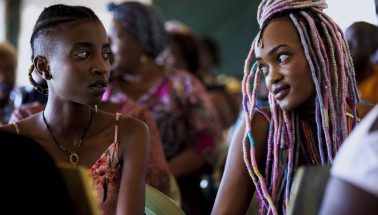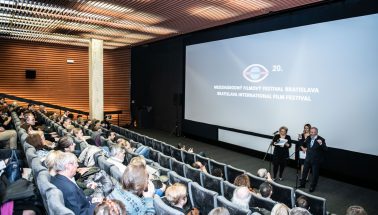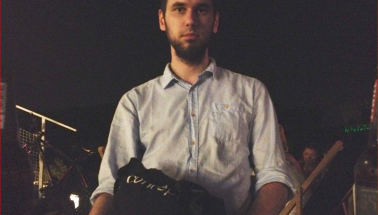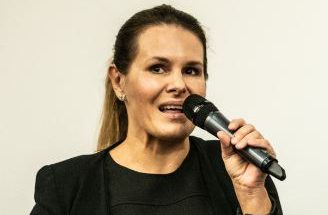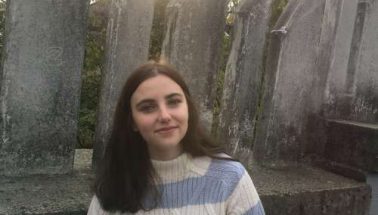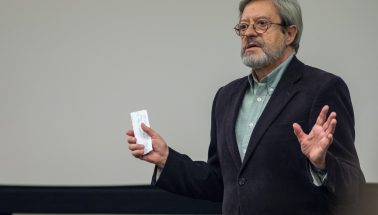At its closing ceremony, the 18th Bratislava International Film Festival announced the winners of all competitive categories including three international competitions. The main awards went to Tramontane (2016) in the category of fiction films, Communion (Komunia, 2016) in the category of documentary films and Adaptation (Adaptacja, 2016) in the category of short films.
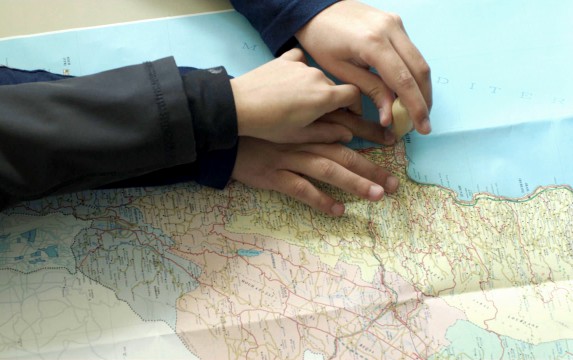
The Awards for the Best Fiction Film, the Best Director, the Best Actress and the Best Actor were this year decided by a three-member jury panel comprising Turkish filmmaker and author Canan Gerede, Czech film historian and scriptwriter Štěpán Hulík and script editor, film theoretician and pedagogue Monika Mikušová of Slovakia.
The Bratislava festival’s Competition of Fiction Films is designed specifically for first and second films by fledgling directors. The Prize for the Best Fiction Film went to Tramontane (2016), a debut by Lebanese filmmaker Vatche Boulghourjian about a search for one’s identity under unusual life circumstances and in unusual social environment. Premiered during the Critics’ Week at this year’s Cannes IFF, the picture tells a story of Rabih, a young blind man from a Lebanese village who plays goblet drum and sings in the local choir. As his ensemble is about to tour in Europe, Rabih applies for a passport only to find out that his ID is forged, which sets him on a journey of discovery about his own life.
The jury awarded this visually impressive film “for its ability to deliver a story of emotion and search for identity through its powerful images and music and its ability to pull us into its world”.
Two statutory awards from Bratislava were taken home by Italian director Marco Danieli for his fiction debut, Worldly Girl (La Ragazza del Mondo, 2016), which won the Prize for the Best Director and the Prize for the Best Actor for Michele Riondino in the role of young drug dealer Liberto, “for his ability to deliver a moving and diversified performance using a wide range of emotions”. Premiered at this year’s Venice IFF, Danieli’s first feature film tells a story of a growing-up young woman who defies the strictures imposed by Jehova’s Witnesses and is forced to face the inevitable radical condemnation of the religious community. The jury awarded Danieli “for delivering a film that treats its subject objectively and accomplished in storytelling, direction of actors and editing”.
The Prize for the Best Actress went to talented Croatian Mia Petričević for rendering the main character in Quit Staring at my Plate (Ne gledaj mi u pijat, 2016), a feature-length debut by Croatian directress Hana Jušić. In the picture, she plays Marijana, a 24-year-old woman from a low-class family who comes to her own after her despotic father’s stroke. Marijana’s entire life revolves around her family whose members live all crammed up in a tiny apartment, driving each other crazy. The jury awarded Petričević “for a very authentic and moving portrayal of a character trapped in a brutal family environment”.
The Prize for the Best Documentary Film was determined by an international jury panel consisting of American filmmaker, film curator and journalist Pamela Cohn, Slovak filmmaker Viera Čákanyová and Croatian documentarist and director of the ZagrebDox film festival Nenad Puhovski. The award went to Communion (Komunia, 2016), a feature length debut by Polish directress Anna Zamecka. In a story about 14-year-old Ola, a prematurely grown-up girl who heroically substitutes the roles of both parents in a dysfunctional family, the moments of pathos seamlessly pass into moments of delightful humour, which had also been appreciated at international film festivals in Locarno and most recently in Warsaw. Calling the picture a “feature début that displays enormous promise” and praising the directress for “an exquisite eye and ear for the telling detail”, the jury justified its choice as follows: “Using sophisticated and precise cinematic language and finely honed instincts, the director creates such tender intimacy with her subjects that we are immediately swept into the hearts and minds of a family always in crisis”.
The Prize for the Best Short Film was unanimously awarded to another Polish picture, Adaptation (Adaptacja, 2016) by director Bartozs Kruhlik. The international jury panel made up of Úna Feely, a programmer at IndieCork festival, Dutch experimental filmmaker Noud Heerkens and Nóra Ružičková, head of a creative studio at the Academy of Fine Arts and Design in Bratislava, appreciated the winning film mostly because it “leads us, keeping one close step ahead of us, but never pushing, or meeting our expectations… this film has all the elements of great filmmaking, balancing everything on a fine artistic edge and genuinely pushing its own genre”.
As usually, entries in the Competition of Fiction Films were also scrutinised by two independent jury panels. The FIPRESCI Jury Award went to My Life as a Courgette (Ma vie de Courgette, 2016), a visually gripping stop-motion animation film by Swiss director Claude Barras about a 9-year-old orphaned boy who keeps trying to find his place in the sun in a strange and often hostile environment until he wins love of a new family. Journalists Andrzej Fogler of Poland, Matúš Kvasnička of Slovakia and Ulrich Wimmeroth of Germany awarded the film for painting a “well-made emotional picture of the world of abandoned children”.
The Student Jury Award was claimed by Mellow Mud (Es esmu šeit, 2016), a feature-length debut by Latvian writer/director Renārs Vimba, a family story that captures the much-topical issue of economic migrants and represents it from a rather unusual viewpoint, examining not the ones who have left but those who are left behind and want to associate their future with their homeland. “Austere dialogue and emphasis on the visual narrative that demonstrates craftsmanship of the filmmakers were the main attributes that gave this film a competitive edge in the Fiction Competition,” wrote the Student Jury panel comprising Norbert Franko, Juraj Mydla and Adam Straka and continued: “The desertedness of Latvian countryside, analogous to the loneliness of main protagonists, managed to produce the rawness in which the mud is dirty, the water is cold, the silence is weighty and the emotions resonate long after the film has ended”.
During the closing ceremony, the Bratislava Film Festival also awarded Martin Huba, one of the most accomplished Slovak actors of his generation who became the most recent laureate of the Lifetime Artistic Achievement Award and the newest holder of a memorial tile on the Film Walk of Fame. The unveiling of the memorial tile on the Film Walk of Fame in front of the P. O. Hviezdoslav Municipal Theatre in Bratislava will take place next June, during the opening ceremony of the 42nd multi-genre city summer festival Cultural Summer and Castle Festival Bratislava 2017.
Another exquisite actor to be awarded during the Bratislava Film Festival was Rade Šerbedžija, a multi-talented artist and one of few Yugoslavian actors who made it all the way to Hollywood. During the opening ceremony of the 18th edition of Bratislava IFF, Mr. Šerbedžija accepted the Award for Artistic Excellence in World Cinematography and then he presented his directorial debut, The Liberation of Skopje (Osloboduvanje na Skopje, 2016), which he made together with his son Danilo.
The Viewers’ Choice award that is based on votes cast by festival-goers went to Aquarius (2016) by Brazilian director Kleber Mendonça Filho, followed by It’s Not the Time of My Life (Ernelláék Farkaséknál, 2016) by Hungarian independent filmmaker Szabolcs Hajdu and All These Sleepless Nights (Wszystkie nieprzespane noce, 2016) by Polish director Michał Marczak. In a remarkable coincidence, the fourth place with exactly the same number of votes was shared by two films from the main competition – Dogs (Câini, 2016), a slow-paced ominous thriller by Romanian director Bogdan Mirică and Mellow Mud (Es esmu šeit, 2016) by Latvian writer/director Renārs Vimba.
The 18th edition of Bratislava International Film Festival took place in a pleasant atmosphere of Bratislava municipal cinemas: three theatres of the Kino Lumière, Kino Mladosť, Kino Nostalgia, and the Gorila.sk Urban Space café, which besides special film screenings also hosted many of the festival’s side events, and the Fuga music club. The festival’s organisational hinterland was provided by Hotel Tatra.
Besides its dominant programme feature, which is three international competitions in three categories (i.e. Fiction Films, Documentary Films and Short Films) that traditionally focus on discovering new talents that may one day become stars of world cinema, the Bratislava Film Festival offered several other attractive programme sections.
Two regular sections, namely Cinema Now and Europa, presented an overview of the best world and European films of the ongoing festival season that is slowly coming to an end, viewers’ favourites and winners from prestigious film festivals around the world. The former section screened, among others, The Birth of a Nation (2016), a potential Academy Award nominee by American actor and debuting director Nate Parker or Lo and Behold: Reveries of the Connected World (2016), a chronicle of the Internet by the legendary Werner Herzog. The latter section included, for instance, The Student (Uchenik, 2016), a drama by Russian director Kirill Serebrennikov that premiered at this year’s Cannes IFF as well as It’s Not the Time of My Life (Ernelláék Farkaséknál, 2016), the winning picture from this year’s Karlovy Vary IFF.
A special subsection of Europa Special traditionally introduced three finalists vying for the LUX Film Prize that has been awarded by the European Parliament since 2007 and this year it is celebrating its tenth anniversary. This time, the three nominees were As I Open My Eyes (A peine j’ouvre les yeux, 2015), Toni Erdmann (2016), and My Life as a Courgette (Ma vie de Courgette, 2016). The winning motion picture will also be available in versions for the sight and hearing impaired.
The pivotal theme of the 18th edition of Bratislava IFF was the city, which was also communicated through a separate section. Offering a colourful palette of motion pictures ranging from attractive stories about the life in town to film essays to modern variations of urban symphony, a favourite genre of film avant-gardists, the section presented titles such as Aquarius (2016) by Brazilian director Kleber Mendonça Filho, All These Sleepless Nights (Wszystkie nieprzespane noce, 2016) by the rising star of contemporary Polish cinema Michał Marczak or Petites Planètes (2010 – 2011), a collection of short music documentaries by Vincent Moon. The main theme was also reflected in the festival’s promotional spot by the Filmaari Creative Studio.
A special section entitled Flashback: U.S. Presidential Elections contributed to perhaps the most vividly debated political event of the year in the form of three documentary films and a special panel discussion. The festival’s educational dimension was again reinforced by Lexicon, a special section whose principal mission is to encourage festival-goers’ critical thinking, create a space for discussion and explain basic cinema categories in a comprehensible way; this time, it was dedicated to the issue of colour in film. The Focus programme section was aimed at contemporary Croatian cinema, which has shown remarkable qualitative progress in recent years. Last but not least, the 18th edition of the Bratislava Festival offered an opportunity for film buffs to meet in person with Alex Ross Perry, a rising star of American independent cinema who personally presented all his films to date and organised a masterclass at which he discussed particularly the issues of artistic freedom or working with traditional film stock, which is characteristic for his pictures.
A special programme section that takes stock of the domestic film production over the past year, Made in Slovakia was dominated by documentary films this year. In Slovak premiere, the Bratislava film festival proudly presented The Professional Foreigner (Profesionálna cudzinka, 2016), a documentary portrait of Slovak-Swiss author and journalist Irena Brežná by documentarist Anna Grusková. The section also offered an overview of the latest creations by the most talented students of the Academy of Arts in Banská Bystrica and the Academy of Performing Arts in Bratislava. For the second consecutive year, Bratislava IFF remembered the youngest generation of festival-goers through a special section Junior that was dedicated to TV bedtime stories. On Sunday morning, the festival presented The Tots (Drobci, 2016), a brand new TV bedtime series co-directed by Vanda Raýmanová and Michal Struss and animated by some of the most respected contemporary Slovak animators such as Ivana Šebestová, Ivana Laučíková, Michal Haruštiak or Dávid Štumpf.
As usually, the latest edition of Bratislava IFF offered festival-goers a unique chance to meet in person with their favourite filmmakers and discuss their films. The list of celebrities who arrived in Bratislava this year included world-famous actor Rade Šerbedžija (The Liberation of Skopje, 2016), Croatian filmmaker Nenad Puhovski (Generation of 68, 2016), Syrian director of Kurdish origin Mano Khalil (The Swallow, 2016), Hungarian filmmaker Szabolcs Hajdu and actress Orsolya Török-Illyés (It’s Not the Time of My Life, 2016), Italian director Marco Danieli (Worldly Girl, 2016), French documentarist Charles Redon (In California, 2016), Polish newcomer Anna Zamecka (Communion, 2016), Dejan Mrkić (Silence, 2016), Pedro Peralta (Ascension, 2016), Anna Grusková and Irena Brežná (The Professional Foreigner, 2016), Director of Croatian Audio-Visual Centre Hrvoje Hribar, Austrian documentarist Franz Leopold Schmelzer and many others. During a unique discussion streamed live from Brussels, the festival-goers in Bratislava also had a chance to ask a question of debuting Tunisian directress Leyla Bouzid.
This year, the festival programme was put together by film critic Nenad Dukić of Serbia, film and art historian Erwin Houtenbrink of the Netherlands and film journalist and dramaturge Tomáš Hudák under the leadership of Bratislava IFF Programme Director Pavel Smejkal.
For the third consecutive year, Bratislava IFF prepared a charity projection at Kino Mladosť in cooperation with Red Nose Clowndoctors civic association. This time, the film festival screened My Life as a Courgette (Ma vie de Courgette, 2016), a stop-motion animation family film by Swiss-French director Claude Barras. In buying tickets to this special screening, festival-goers helped raise extra funds for the civic association that operates a network of health clowns who support mental well-being of hospitalised children and senior citizens through humour and personal approach, thus helping their overall health condition.
During a seven-day film feast, the 18th edition of Bratislava IFF presented the best films of the festival season, which the Bratislava festival takes stock of in a sense as it takes place toward its end. Besides the fact that a vast majority of motion pictures have been presented in Slovak premiere, cinemagoers won’t be able to see most of them anywhere else as they won’t make it to commercial distribution. Apart from the film screenings, the Bratislava film festival also featured an ample and versatile list of multi-genre side events.

